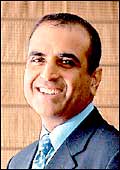 |
| BUILT ON MERIT: Infosys
may not have been the powerhouse it is today had it been forced
to reserve positions on the basis of caste |
 |
Can
a patently retrograde and anti-competitive measure ensure social
and economic justice? The United Progressive Alliance (UPA) government
at the Centre seems to think it can. But if caste discrimination
has been a thorn in the collective flesh of the entire nation,
then the government, by seeking to propagate it further through
caste-based reservations, is just driving the thorn in deeper.
Article 15 of the Indian Constitution expressly prohibits discrimination
on grounds of religion, race, caste, sex or place of birth. Through
the perverse incentive of caste-based reservations, however, the
government is promoting precisely what the founding fathers of
the Constitution had so abhorred. It will be disastrous if the
government carries through its threat of imposing mandatory job
quotas in the private sector. "While no person should be
denied a job based on his caste, it is equally so that no person
should get a job simply on the basis of his caste. Recruitment
should be on the basis of merit," says Sanjiv Goenka, Vice
Chairman, RPG Enterprises.
Some key questions, however, need to be answered.
What are we trying to achieve? Is it non-discrimination? If the
answer is yes, then painting the Dalits (Scheduled Castes and
Scheduled Tribes or SCs and STs) and the Other Backward Castes
(OBCs) with the same brush will not work. Historically, the former
have been outcastes-victims of the invidious practice of untouchability
and their current status, at least in rural India, has not improved
in tandem with the economic progress of the nation. "The
OBCs, (however), are now part of the ruling classes in many states.
Arjun Singh has confused the entire nation," says Dalit activist
Chandrabhan Prasad. This argument is accepted by others as well.
"The case for Dalits is more compelling. One does not want
to use the same instrument of reservations for OBCs," says
Pratap Bhanu Mehta, President and Chief Executive, Centre for
Policy Research (CPR), who, along with sociologist Andre Beitelle,
resigned from the National Knowledge Commission in protest against
mindless caste-based reservations. Mehta also believes that before
we look at reservations, we must answer the questions: What kind
of deprivation are we targeting? What prevents the backward sections
from achieving their full potential? "It is imperative that
the issue is addressed in a larger canvas of education, employability
and entrepreneurship," says J.J. Irani, Director, Tata Sons,
who was Chairman of an industry taskforce on the issue.
How Big Is The OBC Population?
The short answer to that is: No
one knows. The government and its various arms have, at various
points in time, come up with three mutually exclusive answers. |
1980
52%
Mandal Commission Report
1998
34%
National Family Health Statistics
2000
37%
National Sample Survey
|
Pushed to the wall on the issue of job quotas,
and threatened with legislation, industry bodies like the Associated
Chambers of Commerce and Industry of India (ASSOCHAM) and the
Confederation of Indian Industry (CII) have come out with a series
of "voluntary" affirmative action (AA) policies. Explaining
the anti-legislation stance of the industry and countering the
suggestion that the action plan suggested by it is a ploy to stave
off legislation, R. Seshasayee, Managing Director, Ashok Leyland,
and President, CII, says: "Legislation normally ensures that
people follow the letter of the law rather than the spirit of
the law." However, the fact remains that organised private
industry, which employs eight million people, has been consistently
and, often quite vehemently, against job quotas. The rationale:
a country that is positioning itself as the knowledge back-end
of the world cannot compromise on merit.
 |
"Voluntary initiatives
with quantifiable targets are the only way forward and industry
is committed to it"
Sunil Mittal
Chairman & MD,
Bharti Airtel |
Pro-reservationists, however, say social and
economic backwardness prevents the acquisition of merit, leading
to a vicious cycle of no-education-no-jobs and so on. If breaking
this cycle is the goal of reservation, then, logically, education
needs to be targeted, but from the other end of the spectrum.
Rather than opening up access to IITs and IIMs, the emphasis should
then be on strengthening the primary school system in the country.
Says Rahul Bajaj, Chairman, Bajaj Auto, and Rajya Sabha mp: "I
believe reservations are not likely to achieve the objectives
for which they are being demanded. However, the problems of the
economically backward, including the SCs/STs, should not be ignored.
The first thing to do is obviously to ensure good primary education
for all."
If one believes that historical social and
economic practices prevent some groups from acquiring the skills
required to access education and jobs, then other issues emerge.
Caste is only one of the variables limiting performance. Income,
cutting across caste lines, is often a more potent factor in preventing
access to education and jobs. Religion, regional biases and gender
also play their roles in this. As the example of the IITs shows-SC/ST
quotas are seldom fully utilised (see The Story At The IITs)-numerical
quotas do not often serve their full purpose in any of these cases.
| THE EXPERIENCE ELSEWHERE IN THE WORLD |
| Affirmative action
(AA)-measures mandated by law to reverse deep-rooted social
prejudices and political injustices against particular demographic
groups-is not the prerogative of the Indian government alone.
The US has a high profile AA programme aimed at bringing African
Americans (and other minority groups from Asia and Latin America)
into the mainstream. And following the end of apartheid, South
Africa has also adopted measures to promote greater inclusiveness
in its society. The European Union (EU), which uses the term
"positive action", only has provisions for gender
equality.
The term AA was first used by the then US President Lyndon
Johnson in 1965 in an executive order requiring Federal
contractors to ensure employees were not discriminated against
on the basis of their race, creed, colour or national origin.
But the US is now debating the ethics of the voluntary desegregation
plan in public school enrolments following a decision of
its Supreme Court, on August 1 this year, to refuse to reopen
the Lynn School Race Case, which takes race into consideration
when children request transfers to schools outside their
neighbourhoods. President George W. Bush has now taken a
stand against AA saying: "Policies that give minorities
a leg up on white college applicants are an unconstitutional
discrimination and should be struck down by the Supreme
Court."
|
| |
THE VOLUNTARY RESPONSE
The organised private sector accounts
for only around 2 per cent of the
total workforce in India. Yet, for the government it has become
the frontier where its progressive and socially inclusive
policies have to be most visible. Indian industry: |
» Is
unequivocally against legislation for job quotas
» Will
consciously recruit more SCs/STs at all levels
» Will
ensure more appointments/promotions to executive levels
» Promises
to create 100 SC/ST entrepreneurs by next year; to seek help
from SIDBI, NABARD
» Will
sponsor coaching for 10,000 students in 10 universities; to
scale this up to 50,000 students by 2009
» Institute
100 scholarships for study in premier institutes
» Will
institute 5 scholarships for studies in overseas universities
in Year 1; to scale up to 50 in five years
» Ask
individual companies to reserve seats/institute scholarships
in schools run by affiliates
» Will
appoint councils/ombudsmen to ensure action by industry
» Will
compile data on industry-wide progress of its AA programme
» Will
create councils to initiate action against non-compliance
by members |
 |
"I believe reservations
are not likely to achieve the objectives for which they are
being demanded"
Rahul Bajaj
Chairman, Bajaj Auto |
Also, despite the politically-charged debate
raging over reservations, there is no reliable data on the exact
number of OBCs (see How Big Is The OBC Population?) as there has
been no caste-based census since Independence. Analysis based
on consumption data is also inconclusive. Says R.K. Shukla, Chief
Economist, National Council of Applied Economic Research (NCAER):
"There is hardly any difference in the average per capita
consumption of the bottom 20 per cent of all categories of the
population, be it the SCs/STs, the OBCs or others. Quota policy
makers should then exclude the creamy layer of all categories
and include the bottom category of all the classes."
Industry, too, has no caste-based employment
data. "Though it cannot be substantiated with data across
the board, some samples have shown that representation of SCs/STs
in shop floors is much more than is popularly perceived,"
says Irani.
 |
"While no person should
be denied a job based on his caste, no one should get a job
on the basis of his caste also"
Sanjiv Goenka
Vice Chairman, RPG Enterprises |
On job quotas, however, Corporate India has
bought itself a year's time with its "voluntary" action
plan, but the proverbial Sword of Damocles continues to hang over
its head. "Voluntary initiatives with quantifiable targets
are the only way forward and industry is committed to it,"
says Sunil Bharti Mittal, Chairman & Managing Director, Bharti
Airtel. Will Corporate India deliver on this promise? It has no
option, but to. Mere words will not help. But there is only so
much that it can do. "Given that additions in employment
in the private sector is just a very small number-and since it
employs only 2 per cent of the country's total workforce-this
measure will yield very limited results," says Irani.
"While we in industry certainly have
a responsibility for preparing the underprivileged and making
them more employable, such efforts cannot substitute for or absolve
the government of its own responsibility," says Sunil Kant
Munjal, MD & CEO, Hero Cycles.
So what are we shooting for? Brownie points
ahead of elections would be the obvious guess, because rather
than address real issues, reservations create an illusion of inclusiveness
while actually doing nothing for the underprivileged.
|









